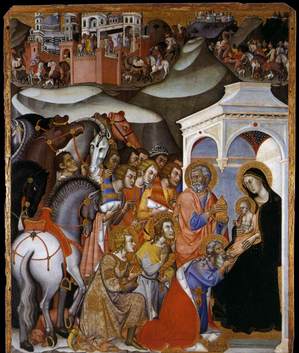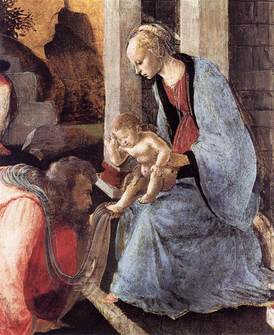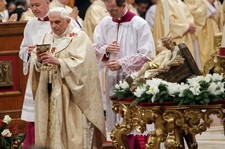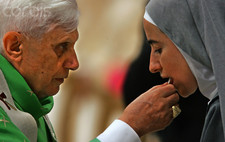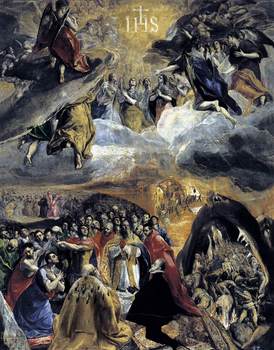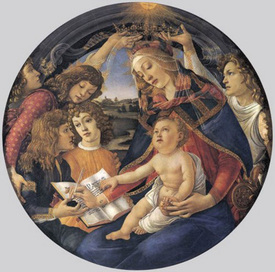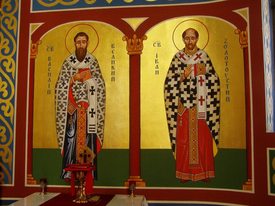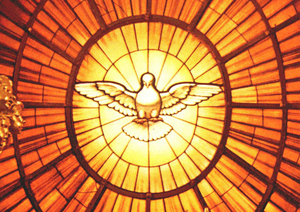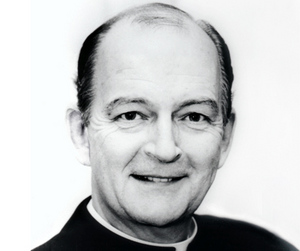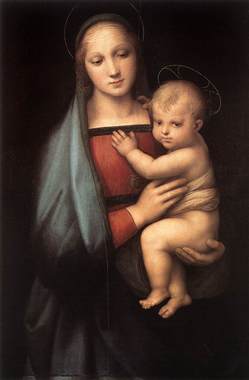 God our Father, may we always profit by the prayers of the Virgin Mother Mary, for You bring us life and salvation through Jesus Christ her Son who lives and reigns with You and the Holy Spirit, one God, for ever and ever.
God our Father, may we always profit by the prayers of the Virgin Mother Mary, for You bring us life and salvation through Jesus Christ her Son who lives and reigns with You and the Holy Spirit, one God, for ever and ever.
The Virgin Mary, who at the message of the angel received the Word of God in her heart and in her body and gave Life to the world, is acknowledged and honored as being truly the Mother of God and Mother of the Redeemer. Redeemed by reason of the merits of her Son and united to Him by a close and indissoluble tie, she is endowed with the high office and dignity of being the Mother of the Son of God, by which account she is also the beloved daughter of the Father and the temple of the Holy Spirit.
There is but one Mediator as we know from the words of the apostle, “for there is one God and one mediator of God and men, the man Christ Jesus, who gave himself a redemption for all”. The maternal duty of Mary toward men in no wise obscures or diminishes this unique mediation of Christ, but rather shows His power. For all the salvific influence of the Blessed Virgin on men originates, not from some inner necessity, but from the divine pleasure. It flows forth from the superabundance of the merits of Christ, rests on His mediation, depends entirely on it and draws all its power from it. In no way does it impede, but rather does it foster the immediate union of the faithful with Christ.
Predestined from eternity by that decree of divine providence which determined the incarnation of the Word to be the Mother of God, the Blessed Virgin was in this earth the virgin Mother of the Redeemer, and above all others and in a singular way the generous associate and humble handmaid of the Lord. She conceived, brought forth and nourished Christ. She presented Him to the Father in the temple, and was united with Him by compassion as He died on the Cross. In this singular way she cooperated by her obedience, faith, hope and burning charity in the work of the Saviour in giving back supernatural life to souls. Wherefore she is our mother in the order of grace.
 This maternity of Mary in the order of grace began with the consent which she gave in faith at the Annunciation and which she sustained without wavering beneath the cross, and lasts until The eternal fulfillment of all the elect. Taken up to heaven she did not lay aside this salvific duty, but by her constant intercession continued to bring us the gifts of eternal salvation. By her maternal charity, she cares for the brethren of her Son, who still journey on earth surrounded by dangers and cultics, until they are led into the happiness of their true home. Therefore the Blessed Virgin is invoked by the Church under the titles of Advocate, Auxiliatrix, Adjutrix, and Mediatrix. This, however, is to be so understood that it neither takes away from nor adds anything to the dignity and efficaciousness of Christ the one Mediator.
This maternity of Mary in the order of grace began with the consent which she gave in faith at the Annunciation and which she sustained without wavering beneath the cross, and lasts until The eternal fulfillment of all the elect. Taken up to heaven she did not lay aside this salvific duty, but by her constant intercession continued to bring us the gifts of eternal salvation. By her maternal charity, she cares for the brethren of her Son, who still journey on earth surrounded by dangers and cultics, until they are led into the happiness of their true home. Therefore the Blessed Virgin is invoked by the Church under the titles of Advocate, Auxiliatrix, Adjutrix, and Mediatrix. This, however, is to be so understood that it neither takes away from nor adds anything to the dignity and efficaciousness of Christ the one Mediator.
For no creature could ever be counted as equal with the Incarnate Word and Redeemer. Just as the priesthood of Christ is shared in various ways both by the ministers and by the faithful, and as the one goodness of God is really communicated in different ways to His creatures, so also the unique mediation of the Redeemer does not exclude but rather gives rise to a manifold cooperation which is but a sharing in this one source.
The Church does not hesitate to profess this subordinate role of Mary. It knows it through unfailing experience of it and commends it to the hearts of the faithful, so that encouraged by this maternal help they may the more intimately adhere to the Mediator and Redeemer.
By reason of the gift and role of divine maternity, by which she is united with her Son, the Redeemer, and with His singular graces and functions, the Blessed Virgin is also intimately united with the Church. As St. Ambrose taught, the Mother of God is a type of the Church in the order of faith, charity and perfect union with Christ. For in the mystery of the Church, which is itself rightly called mother and virgin, the Blessed Virgin stands out in eminent and singular fashion as exemplar both of virgin and mother. By her belief and obedience, not knowing man but overshadowed by the Holy Spirit, as the new Eve she brought forth on earth the very Son of the Father, showing an undefiled faith, not in the word of the ancient serpent, but in that of God’s messenger. The Son whom she brought forth is He whom God placed as the first-born among many brethren, namely the faithful, in whose birth and education she cooperates with a maternal love.
The Church indeed, contemplating her hidden sanctity, imitating her charity and faithfully fulfilling the Father’s will, by receiving the word of God in faith becomes herself a mother. By her preaching she brings forth to a new and immortal life the sons who are born to her in baptism, conceived of the Holy Spirit and born of God. She herself is a virgin, who keeps the faith given to her by her Spouse whole and entire. Imitating the mother of her Lord, and by the power of the Holy Spirit, she keeps with virginal purity an entire faith, a firm hope and a sincere charity.
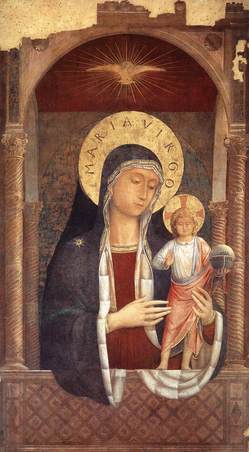 But while in the most holy Virgin the Church has already reached that perfection whereby she is without spot or wrinkle, the followers of Christ still strive to increase in holiness by conquering sin. And so they turn their eyes to Mary who shines forth to the whole community of the elect as the model of virtues. Piously meditating on her and contemplating her in the light of the Word made man, the Church with reverence enters more intimately into the great mystery of the Incarnation and becomes more and more like her Spouse. For Mary, who since her entry into salvation history unites in herself and re-echoes the greatest teachings of the faith as she is proclaimed and venerated, calls the faithful to her Son and His sacrifice and to the love of the Father. Seeking after the glory of Christ, the Church becomes more like her exalted Type, and continually progresses in faith, hope and charity, seeking and doing the will of God in all things. Hence the Church, in her apostolic work also, justly looks to her, who, conceived of the Holy Spirit, brought forth Christ, who was born of the Virgin that through the Church He may be born and may increase in the hearts of the faithful also. The Virgin in her own life lived an example of that maternal love, by which it behooves that all should be animated who cooperate in the apostolic mission of the Church for the regeneration of men. (Lumen gentium 53; 61-65)
But while in the most holy Virgin the Church has already reached that perfection whereby she is without spot or wrinkle, the followers of Christ still strive to increase in holiness by conquering sin. And so they turn their eyes to Mary who shines forth to the whole community of the elect as the model of virtues. Piously meditating on her and contemplating her in the light of the Word made man, the Church with reverence enters more intimately into the great mystery of the Incarnation and becomes more and more like her Spouse. For Mary, who since her entry into salvation history unites in herself and re-echoes the greatest teachings of the faith as she is proclaimed and venerated, calls the faithful to her Son and His sacrifice and to the love of the Father. Seeking after the glory of Christ, the Church becomes more like her exalted Type, and continually progresses in faith, hope and charity, seeking and doing the will of God in all things. Hence the Church, in her apostolic work also, justly looks to her, who, conceived of the Holy Spirit, brought forth Christ, who was born of the Virgin that through the Church He may be born and may increase in the hearts of the faithful also. The Virgin in her own life lived an example of that maternal love, by which it behooves that all should be animated who cooperate in the apostolic mission of the Church for the regeneration of men. (Lumen gentium 53; 61-65)
